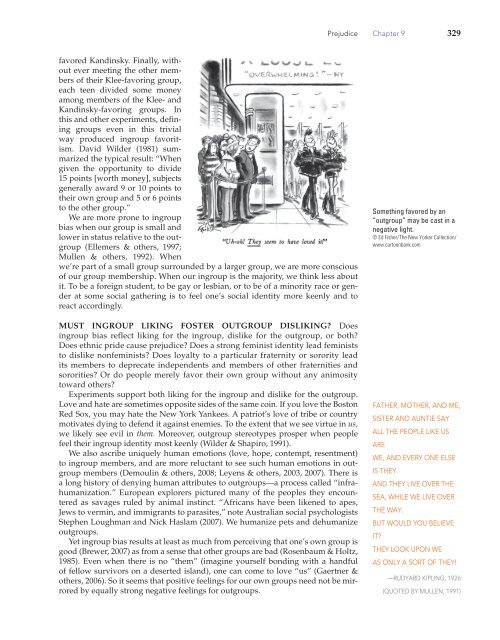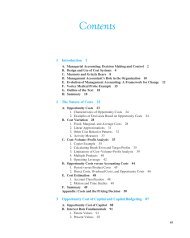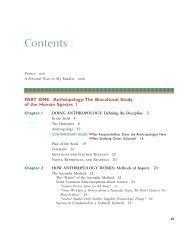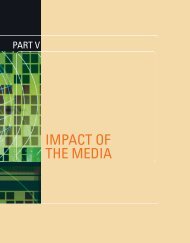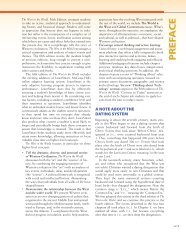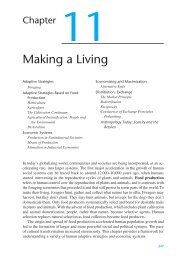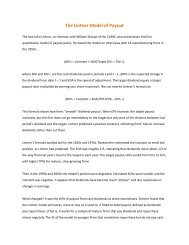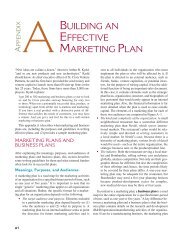Chapter 9: Prejudice: Disliking Others (2947.0K) - Bad Request
Chapter 9: Prejudice: Disliking Others (2947.0K) - Bad Request
Chapter 9: Prejudice: Disliking Others (2947.0K) - Bad Request
You also want an ePaper? Increase the reach of your titles
YUMPU automatically turns print PDFs into web optimized ePapers that Google loves.
favored Kandinsky. Finally, without<br />
ever meeting the other members<br />
of their Klee-favoring group,<br />
each teen divided some money<br />
among members of the Klee- and<br />
Kandinsky-favoring groups. In<br />
this and other experiments, defining<br />
groups even in this trivial<br />
way produced ingroup favoritism.<br />
David Wilder (1981) summarized<br />
the typical result: “When<br />
given the opportunity to divide<br />
15 points [worth money], subjects<br />
generally award 9 or 10 points to<br />
their own group and 5 or 6 points<br />
to the other group.”<br />
We are more prone to ingroup<br />
bias when our group is small and<br />
lower in status relative to the outgroup<br />
(Ellemers & others, 1997;<br />
Mullen & others, 1992). When<br />
we’re part of a small group surrounded by a larger group, we are more conscious<br />
of our group membership. When our ingroup is the majority, we think less about<br />
it. To be a foreign student, to be gay or lesbian, or to be of a minority race or gender<br />
at some social gathering is to feel one’s social identity more keenly and to<br />
react accordingly.<br />
MUST INGROUP LIKING FOSTER OUTGROUP DISLIKING? Does<br />
ingroup bias reflect liking for the ingroup, dislike for the outgroup, or both?<br />
Does ethnic pride cause prejudice? Does a strong feminist identity lead feminists<br />
to dislike nonfeminists? Does loyalty to a particular fraternity or sorority lead<br />
its members to deprecate independents and members of other fraternities and<br />
sororities? Or do people merely favor their own group without any animosity<br />
toward others?<br />
Experiments support both liking for the ingroup and dislike for the outgroup.<br />
Love and hate are sometimes opposite sides of the same coin. If you love the Boston<br />
Red Sox, you may hate the New York Yankees. A patriot’s love of tribe or country<br />
motivates dying to defend it against enemies. To the extent that we see virtue in us,<br />
we likely see evil in them. Moreover, outgroup stereotypes prosper when people<br />
feel their ingroup identity most keenly (Wilder & Shapiro, 1991).<br />
We also ascribe uniquely human emotions (love, hope, contempt, resentment)<br />
to ingroup members, and are more reluctant to see such human emotions in outgroup<br />
members (Demoulin & others, 2008; Leyens & others, 2003, 2007). There is<br />
a long history of denying human attributes to outgroups—a process called “infrahumanization.”<br />
European explorers pictured many of the peoples they encountered<br />
as savages ruled by animal instinct. “Africans have been likened to apes,<br />
Jews to vermin, and immigrants to parasites,” note Australian social psychologists<br />
Stephen Loughman and Nick Haslam (2007). We humanize pets and dehumanize<br />
outgroups.<br />
Yet ingroup bias results at least as much from perceiving that one’s own group is<br />
good (Brewer, 2007) as from a sense that other groups are bad (Rosenbaum & Holtz,<br />
1985). Even when there is no “them” (imagine yourself bonding with a handful<br />
of fellow survivors on a deserted island), one can come to love “us” (Gaertner &<br />
others, 2006). So it seems that positive feelings for our own groups need not be mirrored<br />
by equally strong negative feelings for outgroups.<br />
<strong>Prejudice</strong> <strong>Chapter</strong> 9 329<br />
Something favored by an<br />
“outgroup” may be cast in a<br />
negative light.<br />
© Ed Fisher/ The New Yorker Collection/<br />
www.cartoonbank.com<br />
FATHER, MOTHER, AND ME,<br />
SISTER AND AUNTIE SAY<br />
ALL THE PEOPLE LIKE US<br />
ARE<br />
WE, AND EVERY ONE ELSE<br />
IS THEY.<br />
AND THEY LIVE OVER THE<br />
SEA, WHILE WE LIVE OVER<br />
THE WAY.<br />
BUT WOULD YOU BELIEVE<br />
IT?<br />
THEY LOOK UPON WE<br />
AS ONLY A SORT OF THEY!<br />
—RUDYARD KIPLING, 1926<br />
(QUOTED BY MULLEN, 1991)


